

Shinesun vietnam
Buddhism Basic Beliefs and Teachings. By Barbara O'Brien Updated December 29, 2015.
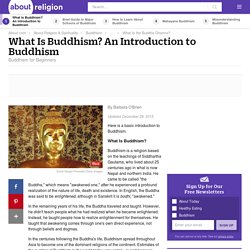
Here is a basic introduction to Buddhism. What Is Buddhism? Buddhism is a religion based on the teachings of Siddhartha Gautama, who lived about 25 centuries ago in what is now Nepal and northern India. He came to be called "the Buddha," which means "awakened one," after he experienced a profound realization of the nature of life, death and existence. Buddhism. Buddhism began in India 2,500 years ago and remains the dominant world religion in the East.
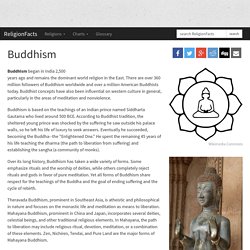
There are over 360 million followers of Buddhism worldwide and over a million American Buddhists today. Buddhist concepts have also been influential on western culture in general, particularly in the areas of meditation and nonviolence. About Buddhism. What is Buddhism. The founder of Buddhism was Buddha Shakyamuni who lived and taught in India some two and a half thousand years ago.
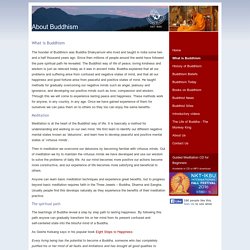
Since then millions of people around the world have followed the pure spiritual path he revealed. The Buddhist way of life of peace, loving kindness and wisdom is just as relevant today as it was in ancient India. Buddha explained that all our problems and suffering arise from confused and negative states of mind, and that all our happiness and good fortune arise from peaceful and positive states of mind. The religion of Buddhism. Religions of the world Menu Quotation by Siddhãrtha Gautama (Buddha): "Do not believe in anything simply because you have heard it.
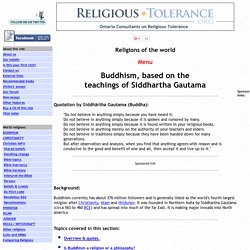
Do not believe in anything simply because it is spoken and rumored by many. Religion: Buddhism. Buddhism - Shambhala. Some 2,500 years ago, an Indian prince, Siddhartha Gautama, sat quietly in a place known as Deer Park at Sarnath and began to offer simple teachings, based on his own experience.

These teachings, referred to as the dharma, meaning simply “truth,” were practical instructions on how to free oneself from suffering by relating to the everyday experience of life and mind. Because his realization was profound, he became known as the Buddha, which means “the awakened one.” Buddhism - Beliefnet. BuddhaNet - Worldwide Buddhist Information and Education Network. Buddhism Facts, information, pictures. Early history Diffusion of Buddhism Southeast Asia Tibet China.
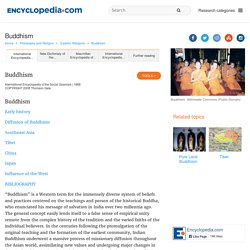
History of Buddhism. The founder of Buddhism in this world is Buddha Shakyamuni.
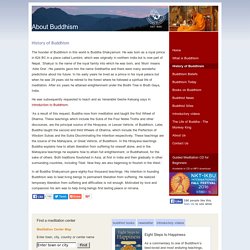
He was born as a royal prince in 624 BC in a place called Lumbini, which was originally in northern India but is now part of Nepal. ‘Shakya’ is the name of the royal family into which he was born, and ‘Muni’ means ‘Able One’. His parents gave him the name Siddhartha and there were many wonderful predictions about his future. Buddhism - definition of Buddhism by The Free Dictionary. The religion of the followers of Gautama Buddha, whose 6th-century B.C. doctrines strongly opposed the formalized, mechanical rituals of the Brahman sect in Hinduism; Buddha’s teachings offered escape from endless reincarnation, a method of spiritual attainment through correct views and actions (The Eight-Fold Path), and a spiritual goal (Nirvana): a soul free from craving, suffering, and sorrow.

See also Eight-Fold Path, The. — Buddhist, n. — Buddhistic, Buddhistical, adj. the method of spiritual attainment outlined in Buddha’ s sermons on the Four Noble Truths: pain, the cause of pain, the cessation of pain, and the path that leads to this cessation, emphasizing, in the last, right view, thought, speech, action, livelihood, efïort, mindfulness, and concentration. the predominant Chinese form of Buddhism, Foh being the Chinese name for Buddha. — Fohist, n. Buddhism. An Introduction to Buddhism. An Introduction to Buddhism To do no evil; To cultivate good; To purify one's mind:
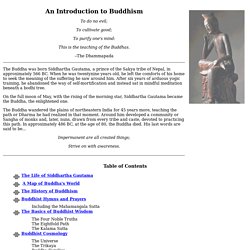
Buddhism. I.
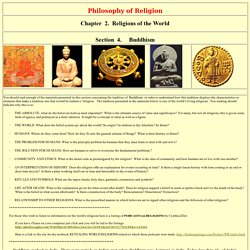
IntroductionBuddhism, a major world religion, founded in northeastern India and based on the teachings of Siddhartha Gautama, who is known as the Buddha, or Enlightened One. See Buddha.Originating as a monastic movement within the dominant Brahman tradition of the day, Buddhism quickly developed in a distinctive direction. The Buddha not only rejected significant aspects of Hindu philosophy, but also challenged the authority of the priesthood, denied the validity of the Vedic scriptures, and rejected the sacrificial cult based on them. Moreover, he opened his movement to members of all castes, denying that a person's spiritual worth is a matter of birth. See Hinduism.Buddhism today is divided into two major branches known to their respective followers as Theravada, the Way of the Elders, and Mahayana, the Great Vehicle. Sacred Texts: Buddhism. Sacred-texts home Journal Articles: Buddhism OCRT: Buddhism Buy CD-ROM Buy Books about Buddhism Modern works Southern Buddhism Northern Buddhism JatakaLinks Modern works The Gospel of Buddha: Compiled from Ancient Records by Paul Carus [1909]A modern retelling of the Buddha's work and life.
Buddha, the Word by Paul Carus. Buddhism Beliefs. Since some background knowledge of rebirth and karma is useful for understanding Buddhism, there now follows a brief introduction to these topics taken from Geshe Kelsang’s book, Eight Steps to Happiness: The mind is neither physical, nor a by-product of purely physical processes, but a formless continuum that is a separate entity from the body.
The mind is neither physical, nor a by-product of purely physical processes, but a formless continuum that is a separate entity from the body. When the body disintegrates at death, the mind does not cease. Although our superficial conscious mind ceases, it does so by dissolving into a deeper level of consciousness, call ‘the very subtle mind’. Buddhist Beliefs - Kadampa Buddhism.
All living beings have the same basic wish to be happy and avoid suffering, but very few people understand the real causes of happiness and suffering. We generally believe that external conditions such as food, friends, cars, and money are the real causes of happiness, and as a result we devote nearly all our time and energy to acquiring these.
Superficially it seems that these things can make us happy, but if we look more deeply we shall see that they also bring us a lot of suffering and problems. Happiness and suffering are opposites, so if something is a real cause of happiness it cannot give rise to suffering. Buddhism. Buddhism is one of the most important Asian spiritual traditions. During its roughly 2.5 millennia of history, Buddhism has shown a flexible approach, adapting itself to different conditions and local ideas while maintaining its core teachings. As a result of its wide geographical expansion, coupled with its tolerant spirit, Buddhism today encompasses a number of different traditions, beliefs, and practices.
Buddhism Origins, Buddhism History, Buddhism Beliefs. Most historians agree that Buddhism originated in northern India in the 5th century B.C.E. The tradition traces its origin to Siddhartha Gautama (or Gotama), who is typically referred to as the Buddha (literally the "Awakened" or "Enlightened One"). Siddhartha observed the suffering in the world and set out to find an antidote. Through meditation and analysis, he attained an enlightened state of being that marked the end of attachments (and therefore suffering), and ultimately, upon his death, release from the cycle of rebirth (samsara). The Buddha's teachings are often summarized in the Four Noble Truths, which form the basis of the first sermon he delivered after attaining enlightenment, and the Eightfold Path, which provides a basic guide for how to live in the world.
What do Buddhists believe - Beliefs of Buddhism. Buddhist beliefs. Overview of Korean Buddhism – Zen Buddhism. With the purified divine eye, surpassing that of men, a Buddha sees beings as they pass hence or come to be. Holographic #Bamiyan Buddha HT @M_T_Miller cf. @BjoernGebert @schelbertgeorg. I'm glad I'm dead I'm worthless like this fucking Buddha head. If a smiling Buddha salad is on the menu, how can you consider anything else?
All wrong-doing arises because of mind. If mind is transformed can wrong-doing remain? - Buddha. The Stone Buddha gets the #STLCards out of a bases-loaded, no out jam! Buddha_fix's photo. Snowflake Obsidian Bracelet Set at Xen Jewelry #etsy #yoga #buddha #jewelry. I'm lowkey a Buddha. What we think, we become. - Buddha #brainyquote #QOTD #inspirational #flowers. Buddhism. Buddhism Basic Beliefs and Teachings. 5 Minute Introduction. Buddhism. Basics of Buddhism. About Buddhism. Buddhism. The Buddhist Centre.
About Buddhism: History, Teachings, and More. Buddhism. What is Buddhism. The religion of Buddhism. Religions - Buddhism: Buddhism at a glance. Buddhism and Meditation from the Triratna Buddhist Community (formerly FWBO) Religion: Buddhism. Buddhism - Shambhala. Buddhism - Beliefnet. BuddhaNet - Worldwide Buddhist Information and Education Network. Buddhism Facts, information, pictures. History of Buddhism.
Namaste Mudra - The prayer position // print 11x16 (A3) - ... - #yoga #beforeandafter. The Benefits of Buddhism! (Reasons to Live a Buddhist Life) Japanese Buddhism ZEN shu Hanging Scroll Set 3pc Gold Navy Red NEW 541f03. @megrar I just don't really bother w religion n stuff, but buddhism is pretty nice, it's more of a concept to live by than a religion. Dōgen Zenji — "A fool sees himself as another, but a wise man ..." Red - Colour Symbolism in Buddhism. Thai Women in Buddhism by Chatsumarn Kabilsingh (1991, Paperback)